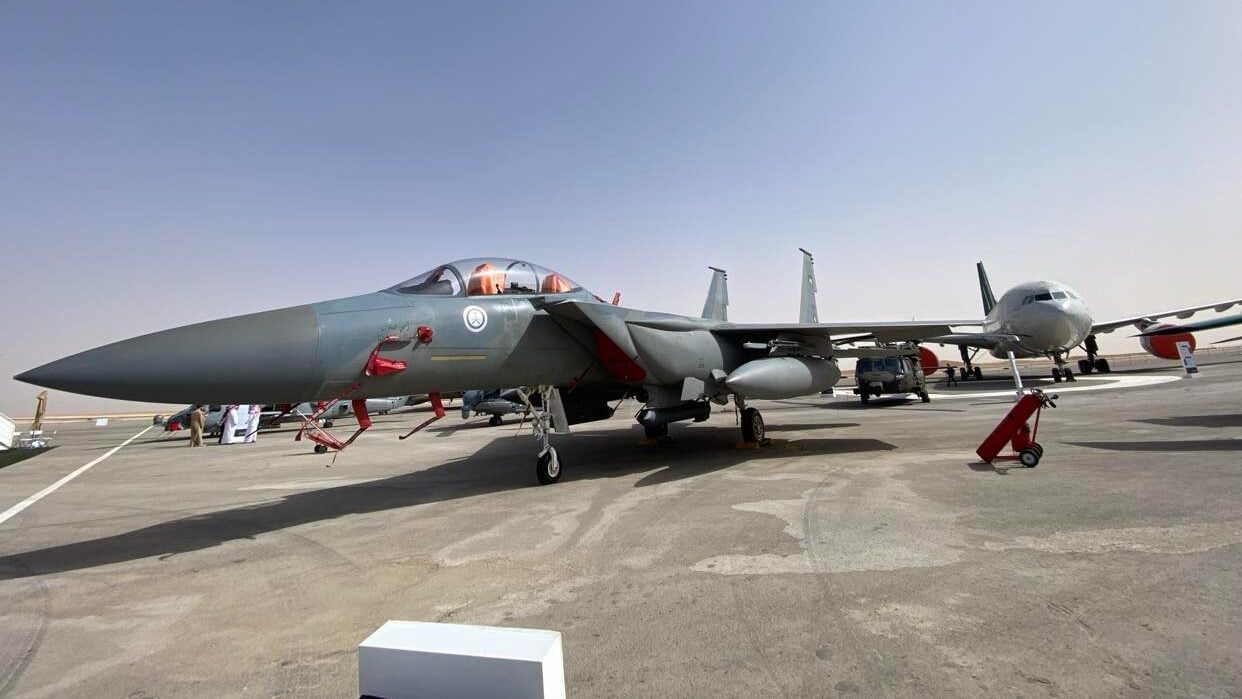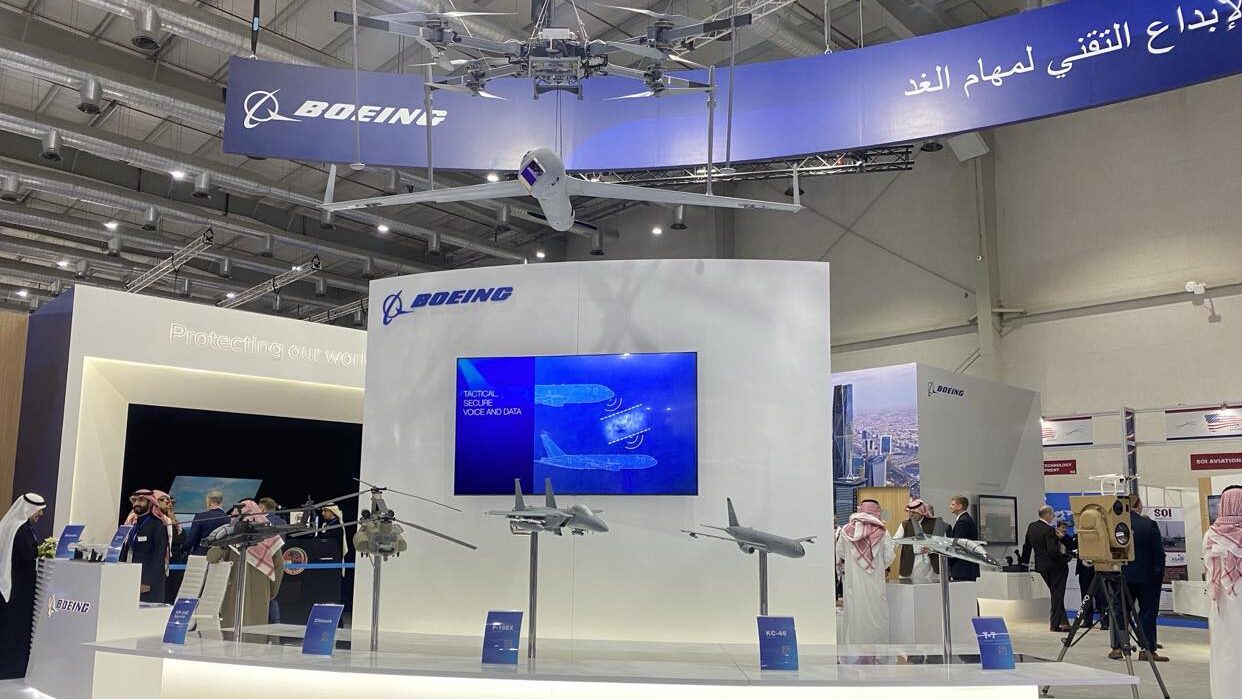
A Saudi F-15 SA on display at World Defense Show 2024 in Riyadh. (Agnes Helou / Breaking Defense)
WORLD DEFENSE SHOW 2024 — Amid it’s high-profile troubles in the commercial sector lately, Boeing is predicting a boost in international defense sales with a “good portion” coming from customers in the Middle East, the head of Boeing’s defense arm told Breaking Defense here in Riyadh.
“I won’t be overly specific in the region, but if you think about our global business, it’s about 30 percent non-US right now, and that will grow to about 40 percent. My expectation is a good portion of that will come from this region of the world through countries,” Boeing Defense, Space & Security President and CEO Ted Colbert said.
As to whether sales to the region can be a lifeboat to Boeing amid a rocky start to 2024, Colbert said, “I wouldn’t be that specific, I think that we’ve got a lot of campaign work going on around the world and it all matters. It really does.
“This region really matters as well. We have a history with the region of pulling together investment on some of our products, and then developing the next product that really services everyone well,” he said.
Colbert pointed specifically to the “next generation of the F-15” but also mentioned opportunities with Chinook and Apache helicopters.
RELATED: Lockheed Martin strikes subcontractor deals in Saudi Arabia for local THAAD parts production
Saudi Arabia, of course, is a key customer in the region, for example having purchased a fleet of 84 F-15s more than a decade ago for an eye-watering $30 billion. But the relationship could become complicated in the wake of the Kingdom’s mandate, in line with its Vision 2030, that foreign defense firms that wish to do business establish a regional headquarters within Saudi borders. Several major international defense firms, including Boeing, have regional headquarters in neighboring United Arab Emirates.
Bloomberg first reported Tuesday that Boeing planned to apply for a Saudi headquarters. Boeing officials confirmed the application to Breaking Defense, but said it does not mean it’s transferring offices from the UAE. Boeing is already established in Saudi Arabia as Boeing Saudi Arabia, with Saudi leadership and a majority Saudi employee base. It has established a joint venture with Saudi Arabian Military Industries (SAMI) for rotary fleet maintenance, repair and operations.

Boeing displays models of its aircraft at World Defense Show 2024 in Riyadh. (Agnes Helou / Breaking Defense)
Colbert, who spoke to Breaking Defense Monday, said, “I don’t know if we read the [regional headquarters] request that specifically but we are working with the government to make sure that we support whatever the request turns out to be in the right way and, again, I think our interpretation may be a little bit different than you described.”
Elsewhere, on the first day of WDS 2024, Boeing signed a memorandum of understanding (MOU) with the Saudi-based firm Bahri Logistics “to explore collaborative efforts in the areas of supply chain and distribution in the Kingdom of Saudi Arabia,” according to a Bahri statement.
“We’re still working through all the details, it’s still an MOU the initial stages. But [we are] very positive […] I’m confident that’s sort of the first milestone in developing a bigger and broader relationship in the context of supporting Vision 2030,” Colbert told Breaking Defense.
At the static display in WDS second edition, Boeing’s aircraft used by the Royal Saudi Air Force and Saudi National Guard were on hand, including F-15SA fighters, AH-64E Apache helicopters, CH-47 Chinook heavy lift helicopters and E-3A AWACS aircraft.
Colbert highlighted especially the F-15’s popularity in the region, as well as the Saudi and Qatari investment in the upgraded F-15 EX.
“We believe the F-15 continues to be a strong platform for the world, it has the most capability to carry munitions and weapons are relative to any of its competitors. The [F-15] EX, which we developed, and was sort of invested in by the region, has also new and modern sensing and avionics capability,” he said. “So we’re working a lot with in the region to bring that capability to bear here, even more than that as a work in progress as well.”
At its stand in the show Boeing also displayed a T-7 A trainer simulator in an attempt to pitch it to the region.
“The T-7A simulator, [which] is a training system… we are obviously promoting the importance of training and our trainers around the world and this region, training pilots obviously not trivial. There’s a lot of opportunity around the world do that. The T-7A is digitally produced there’s a design capability that allows you to train on any fighter by changing the displays and everything else in the plane. And it’s a whole training system that really supports the modern training needs of the warfighter,” Colbert said.
RELATED: Boeing’s T-7 trainer faces new delivery delay amid parts ‘challenges’
Regarding potential sales of the T-7A trainer to the Middle East, Colbert said that “those conversations are in progress, I can’t go further than that, obviously, because we haven’t signed anything and nothing’s been formalized.”
Colbert added that the priority right now is working through the first contract with the United States Air Force, and then Boeing will figure out what the future looks like for the trainer. He suggested Boeing could explore co-development of variants that are “better suit the needs of the region.”
“But again, those conversations are ongoing. … But I’m really encouraged by some of the interests of calling the region,” he said.
He added that his company is not only selling new capabilities, but “our services business is making sure that these planes and helicopters keep flying, so availability and reliability also important, and that is another sort of the wraparound of, the platforms that that we have on display.”
Colbert added that Boeing is in talks with the Saudi Ministry of Defense regarding cooperation on the defense-related space sector.
“We’re talking to them about what their opportunities are [and] what they’d like to work on. Obviously, we’ve got to work through the United States government, and hopefully, we find a way to work together going forward we’ve got a ton of capability in the Boeing Company. We look forward to any future partnerships we can work through, its has not been defined yet, but we’re open to it,” Colbert told Breaking Defense.








